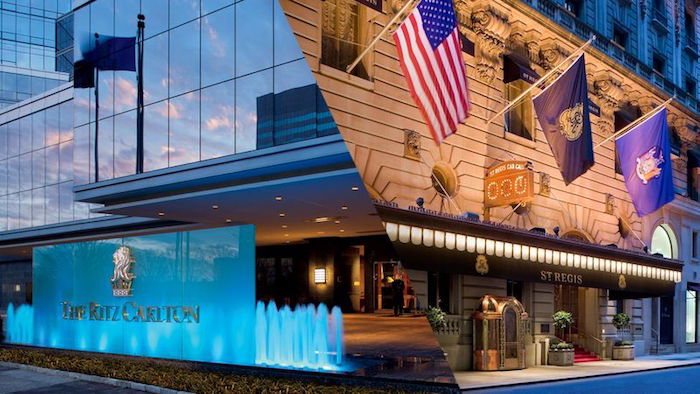For the most part the major hotel chains don’t actually own the individual hotels, but rather just have management contracts to operate them. They get a percentage of the hotel’s revenue, and in exchange for that they market and operate the property.
The major hotel chains are going for an even more asset-light strategy than before, given that several of the hotels actually owned by the major hotel chains (which represent a small percentage of their overall portfolio) have been sold over the past few years.
The fact that the hotel chains don’t own individual hotels is another reason they’re coming up with so many new brands. When Marriott’s takeover of Starwood is complete, the chain will have 30 hotel brands, which is sort of insane. [Update: you can read all the details of the new Starwood/Marriott program here.]


In reality all these new brands aren’t designed to sell directly to consumers, but rather are designed to sell to investors. There are only so many Westins you can put in a city, but if you create unique brands with different value propositions, like Aloft, St. Regis, Tribute Collection, etc., it’s easier to justify more properties while keeping existing owners happy.

Throughout the merger process I’ve been surprised by the lack of protesting from individual hotel owners (at least publicly)
To give an example, I’m in Madrid at the moment, and there’s one Starwood property (the Westin Palace Madrid), and one Design Hotels property. Marriott, on the other hand, has 10 properties. Surely the Westin isn’t happy about the fact that they don’t have the advantage of near exclusive access to a loyal member base anymore?

Westin Palace Madrid Hotel
Well, it looks like we’re now finally seeing a lawsuit from an individual hotel against Starwood relating to the Marriott takeover. Per Bloomberg:
Cityfront Hotel Associates Limited Partners, the owner of the Sheraton Grand Chicago, and Dream Team Hotel Associates LLC, which owns the Westin Times Square in New York, sued Marriott and Starwood in New York state court Tuesday, arguing the merger would unfairly eat into their business. Sheraton and Westin are units of Starwood. The lawsuit seeks to block Marriott and Starwood from taking steps to finalize the purchase.
The plaintiffs say the deal would violate contract clauses that prohibit Starwood from owning, franchising, operating or managing other hotels within a specific geographical area around the two hotels.
This has the potential to set an interesting precedent. If the hotel does in fact have a clause preventing Starwood from operating another hotel within a certain geographical area, is Starwood counting on being able to get away on a technicality, since Starwood as such will cease to exist when the takeover is complete? I have to assume Marriott and Starwood considered this when they entered into an agreement.
I’m curious to see what happens in this case. I doubt Starwood will settle, given that they’d be opening themselves up to similar claims from many other individual hotels. I wonder whether Starwood will be able to get away with this on a technicality, or if this is the start of something big.
Regardless, I certainly do feel bad for the individual hotels. The Westin Times Square will soon be competing with the Marriott Marquis even among their own loyal member base, which is two blocks away and the second biggest hotel in the city.

Westin Times Square New York
What do you make of this lawsuit against Starwood?





It will be interesting to see how an individual hotel validates a contract breach. IF (and it is a big if) after the merger, you don't cross-pollinate the loyalty programs, and you don't show the other's properties on a reservation inquiry, then the client's experience hasn't changed.
I stayed at The Westin Hotel in Saint Martin, Owned by Starwood Hotels, and managed by the Dawn Beach Club until I found ants all over the kitchen, then cockroaches, the place was so dirty and disgusting. So I elected not to buy only to find that the Dawn Beach Club fraudulently charged my credit card. This hotel and the staff that work there are a complete scam.
I am (was) a loyal SPG member earning over 1Million points / year. Their points use to be best in the industry. Recently (and likely because Marriott points are cheap by comparison), Starwood has been devaluing points by raising hotel categories and their respective points by almost double. Used to be a $400 room would cost 20,000 points. Now 20,000 points get you a $200-250 room. My company has stopped loyalty and spending on SPG...
I am (was) a loyal SPG member earning over 1Million points / year. Their points use to be best in the industry. Recently (and likely because Marriott points are cheap by comparison), Starwood has been devaluing points by raising hotel categories and their respective points by almost double. Used to be a $400 room would cost 20,000 points. Now 20,000 points get you a $200-250 room. My company has stopped loyalty and spending on SPG as a result. It is unlikely Marriott will get our loyalty either.
As an Starwood ( Sheraton ) Employee i would rather say that Marriott and Starwood should happen because Marriott really cares for their Staff & guests Where Starwood only care of there guests giving ZERO value to Staff ( Employee ) Starwood leads with 20 to 25 years same managements with old perspectives where Marriott is known for his Creativity
"Marriott and Starwood - the merger of silence and corruption.
A demand for corporate transparency and integrity in the hospitality industry"
www.thepetitionsite.com/takeaction/479/463/831
1. What professor doesn't capitalize Sydney?
2. "There are only so many Westins you can put in a city" and that is based on demographics like 12 million vs 1 million population ;-)
"There are only so many Westins you can put in a city"
Tell that to IHG, who has four Holiday Inns in Singapore (granted two are Express) and even more in Shanghai.
I have evidence that completely refutes Osprey's evidence. I'm just waiting for the right time to sell it to Marriott.
I have evidence that could get the DOJ and FBI to stop the merger at once. I've been looking into this hotel merger since last July.
In the rare cases where I need to be in Times Square, as an SPG lifetime platinum I stay at the Westin.
I just looked up the Marriott Marquis in TripAdvisor, and is rated as the same level (same 4.5 stars) but with a higher customer satisfaction score, and its location is better. At parity (or quasi-parity) of elite treatment there's no doubt I would book the Marquis, so I can see why the Westin owners would be worried!
It's nice to hear an explanation from someone with actual knowledge .
I am a lawyer in New York City, where this case was filed, and noted in an earlier comment that this attempt to block the merger was "frivolous." In response, a user writing under the pseudnoymn "lets all douche" made a series of ad hominem attacks that involved name-calling -- without responding to the substance of my argument. The user -- who describes him or herself as a professor "at a prestigious university in sydney"...
I am a lawyer in New York City, where this case was filed, and noted in an earlier comment that this attempt to block the merger was "frivolous." In response, a user writing under the pseudnoymn "lets all douche" made a series of ad hominem attacks that involved name-calling -- without responding to the substance of my argument. The user -- who describes him or herself as a professor "at a prestigious university in sydney" -- asserted that my comment "is the sort of comment one would expect from from [sic] a douche bag attaching a 'douch [sic] fest' on the executive floor during happy hour."
I will not resort to name-calling as this user has, but I would like to point out that I have actually reviewed the complaint in this case, and as a lawyer in New York City, I have informed views on the matter. (This is not legal advice, just my thoughts on reading the complaint.)
The complaint articulates claims for breach of contract and breach of fiduciary duty. But the very language quoted in the complaint undermines many of the claims, as the plain language of the contract disclaims any fiduciary duties owed by Starwood to these hotels. Although the breach of contract claims are more colorable, the complaint itself quotes many contractual provisions that call into question whether there is any breach of contract claim. There are rules in the contract pertaining to what kind of competing hotels can be built in relation to other hotels, but many of these rules are brand-specific -- meaning Starwood can't open a Sheraton right next to another Sheraton, but can open a St. Regis or (as relevant here) a Marriott, which is a different brand. Some of the rules are not brand-specific, but there appear to be successor liability limitations that might limit the extent to which a merged company is bound by those rules.
But even assuming (just for the sake of argument) that these plaintiffs have a valid claim, the request to block to merger would *still* be frivolous for several reasons: (1) Starwood's contract with these plaintiffs is a services contract, and under New York Law, breach of a services contract is compensable only by an award of money damages. Specific performance is not available as a remedy. (2) Even assuming (contrary to fact) that this was not a services contract, specific performance *still* would not be available because money damages can fully redress the injury. These for-profit hotels can be compensated for any loss of business (assume they suffer any) with damages paid by Starwood. As I acknowledged in my earlier comment, they could use this to get a small monetary settlement -- but I suspect it will be difficult for them to show that they lost business after the merger. Any damages award involving a few individual hotels will be minimal for Marriott. (3) Again even assuming (contrary to fact) that money damages could not compensate their injury, such that some kind of specific performance was necessary, the remedy would not be to block the merger. The contract these hotels have gives them no right to prevent mergers, only to prevent competing hotels operating in their exclusivity zone. So, at most, Starwood would have to either renegotiate with these plaintiffs to let them out of their contract early or would have to negotiate to drop other, competing hotels within the exclusivity zone. A few random hotels in Chicago and New York don't get to just go around blocking mega-mergers because they're unhappy about one dinky Marriott down the street. The remedy will be limited to enforcing their rights under the contract, which does not include any right to "block" Starwood from merging. (4) These plaintiffs have not even filed a motion for a preliminary injunction, which they would need to do if they really want to "block" the merger. As it is, they just have a pending breach of contract lawsuit. That does not prevent Starwood-Marriott from moving forward unless and until a judge issues an injunction. Since they haven't even asked a judge to do anything, the claim likely will simply become moot when the merger is completed. The plaintiffs can still seek money damages from the new company when that happens.
For all these reasons, I do think the claim to block the merger is frivolous. I should note that Marriott studied the exclusivity contracts as part of its due diligence and publicly disclosed that only two hotels in the entire combined portfolio have conflicting exclusivity rights. It’s possible these hotels are the two they found (or maybe these two hotels mis-read their contract). Either way, this is not a new frontier for challenging the Starwood-Marriott deal. At best, Marriott will have to pay a small amount to settle breach of contract claims at a few hotels. Some small-scale litigation like that is routine in any large merger.
@lets all douch - "To say its frivolous is the sort of comment one would expect from from a douche bag attending a “douch fest” on the executive floor during happy hour."
Are you related to DCS by any chance?
As a professor of law at a prestigious university in sydney its by no means frivolous for individual hotels to legally intervene in preventing mergers that will ultimately effect their cashflow and position in the market.
Also if there are clauses stipulating that mergers cannot occur because of geographical positioning of other hotels post merger then this needs to be taken seriously.
To say its frivolous is the sort of comment one would...
As a professor of law at a prestigious university in sydney its by no means frivolous for individual hotels to legally intervene in preventing mergers that will ultimately effect their cashflow and position in the market.
Also if there are clauses stipulating that mergers cannot occur because of geographical positioning of other hotels post merger then this needs to be taken seriously.
To say its frivolous is the sort of comment one would expect from from a douche bag attending a "douch fest" on the executive floor during happy hour.
No photo credit for pictures you did not take/compose?
What I don't understand from the properties perspective is that, they've competed on a much bigger basis with the property across the street for many years, what's changing? Nothing, in fact it's BETTER for them because it opens up Marriott's much larger loyalty audience to book their property. Never mind the fact that so many SPG properties in the US skate by on non-renovated, old properties simply by being the only game in town for...
What I don't understand from the properties perspective is that, they've competed on a much bigger basis with the property across the street for many years, what's changing? Nothing, in fact it's BETTER for them because it opens up Marriott's much larger loyalty audience to book their property. Never mind the fact that so many SPG properties in the US skate by on non-renovated, old properties simply by being the only game in town for SPG. If anything, this might trim the ranks a bit of the properties that aren't up to snuff but which SPG wouldn't de-flag because they needed a presence. Certainly the Westin Times Square isn't one of those, but there are plenty of them in the US (less-so abroad for SPG).
This is a complex issue. Mostly because these hotel owners are likely considered franchisees and franchise law is a state law issue. That means Marriott needs to win in each state, its not just one consolidated lawsuit. I agree it is unlikely to hold up the merger but there is risk. If they go ahead with the merger while this litigation is pending (the litigation will take years for appeals to play out) and then...
This is a complex issue. Mostly because these hotel owners are likely considered franchisees and franchise law is a state law issue. That means Marriott needs to win in each state, its not just one consolidated lawsuit. I agree it is unlikely to hold up the merger but there is risk. If they go ahead with the merger while this litigation is pending (the litigation will take years for appeals to play out) and then lose in any state with a large number of SPG hotels, they could end up owing a huge amount of money.
I agree its unlikely but franchisee law is often very franchisee friendly. Small business owners are active politically and in most states have gotten favorable laws drafted. Local small business owners are just more tuned into state politics than are big multi-national corporations. I don't think the hotel owners have much of a chance but if they succeed in NY, CA or other large states, Marriott is in a world of trouble.
Good luck for them in blocking this merge. They are done.
Lucky, I am a lawyer. This case will not succeed in obtaining anything more than a modest monetary settlement. In connection with major deals, it is common for affected parties to file frivolous litigation threatening to "block" the merger. Usually the lawyers who bring these cases just want a quick settlement and then they will go away. The cases usually have very little merit, but it is easier for companies to pay some token amount...
Lucky, I am a lawyer. This case will not succeed in obtaining anything more than a modest monetary settlement. In connection with major deals, it is common for affected parties to file frivolous litigation threatening to "block" the merger. Usually the lawyers who bring these cases just want a quick settlement and then they will go away. The cases usually have very little merit, but it is easier for companies to pay some token amount and lawyers' fees than to hold up a mega-deal like Starwood-Marriott for frivolous litigation like this.
We were just at the Westin Palace Madrid this past weekend! Nice upgrade to a suite. Helpful concierge. Go on a tapas tour with Devour Madrid. Awesome tapas and good history, too!
I can think of a ton of SPG properties for which this merger is very very bad news
I worked for a major hotel chain and the owners certainly do protest when we flag another hotel directly across the street. However, with a straight face, we say: "But this is a Sheraton Suites. It's totally different than a Sheraton."
There are "Areas of Protection" in the contracts, but there are also typically change of control provisions protecting the franchisor. I'm not a lawyer, but I doubt the the lawsuits will prevail.
I think the odds of this stopping the merger are approximately zilch.